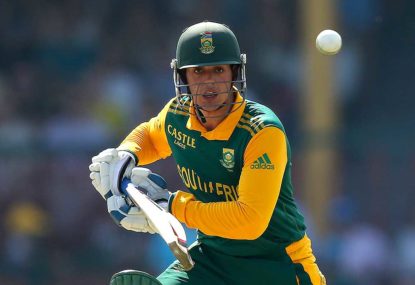Team of the Month: a May-born World Cricket XI
This series’ twelfth and final team has a distinct West Indian flavour at the top of the order, and a domineering captain.

Golfing great Gary Player’s bedside companion was ‘The Power of Positive Thinking’. It might be a good idea for those with an eye on the World Cup cricket trophy to read Norman Vincent Peale’s book, too.
The list is long of batsmen who can swing a bat with skill and bowlers who can deliver a ball sublimely at great speed, but the number of players who can do this under pressure is far shorter.
The six inches between your ears is what counts rather than the four inches in width of a cricket bat.
The word ‘choke’ is about as popular in cricket as it is in golf. Take a wild and anxious swing with a bat or take a shaky jab with a putter in golf and failure looms. Give a cricketer such as Australian all-rounder James Faulkner a chance to hit the winning shot or golf’s Tiger Woods a clutch putt to win a tournament and my money would be on them.
South Africa’s Proteas have too often choked with victory in their sights, notably in the 1999 World Cup. Call it unfortunate if you like, but Herschelle Gibbs dropped the World Cup, as Aussie skipper Steve Waugh was said to have quipped during the Super Six stage. Then, too, when Allan Donald dropped his bat and was run out when victory was nigh in the semi-final against Australia.
But the past is where it belongs and we now have another great chance to lift the trophy. The Proteas’ top six batsmen, Quinton de Kock, Hashim Amla, Faf du Plessis, AB de Villiers, David Miller and JP Duminy have been impressive. And our strike bowlers led by Dale Steyn, Morne Morkel, Vernon Philander, supported by Duminy and Imran Tahir can do the job.
De Villiers of course is a world-beater with a bat in hand, Amla a steadying influence who builds an innings, along with de Kock and du Plessis, and Miller can light up a game with his hitting.
Our problems come at the number seven batsman, where Fahaarn Berhardien has failed to click, and a tail that has not come up with the goods. The Proteas have also flopped in the ‘death’ overs, and Steyn has often leaked too many runs for a paceman of his ability. However, he is a proven match-winner and rated the best quick on the planet.
Confidence is key. If we get a good start from the top six batsmen, anything goes. But if we don’t, we could get knocked over by the Australians, the Kiwis and India. I don’t rate England, especially without Kevin Pietersen, another batsman who can turn a game. The England selectors haven’t liked his attitude and dropped him. They should have handled their star player better and will pay the price because they didn’t. It’s a bit like dropping Tiger Woods during his heyday from the Ryder Cup team because of his behaviour.
On paper, the Aussies have the best side in the tournament: they bat nearly all the way to 10 with Brad Haddin taking stance at eight. Faulkner, if fit, Mitchell Starc and Mitchell Johnson can make runs, too, and they present a formidable line-up with David Warner, Aaron Finch, Shane Watson, Steve Smith, Michael Clarke, Glenn Maxwell and Mitchell Marsh leading the way. Backed by an bowling attack featuring Johnson, Starc, Josh Hazlewood, Watson, Marsh and Maxwell, and that’s as good as it gets. With Clarke returning, either Watson or George Bailey will be dropped – my guess is Bailey will make way.
New Zealand can hardly be tagged the ‘dark horses’. They are one of the tournament favourites, winning four of their past five one-day matches. Playing at home they will be difficult to beat, especially on their fields with short boundaries.
Making predictions can be hazardous. If they were worth anything, we could hold the prize giving first, give the trophy to Australia, and hold the tournament afterwards. If teams mind their heads along with their hands, anyone could win.